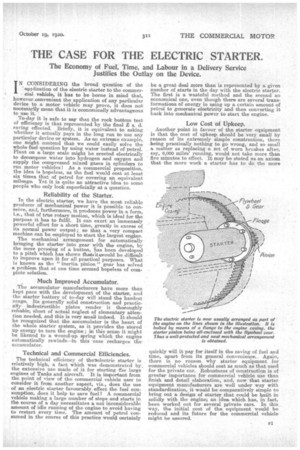• THE CASE FOR THE ELECTRIC STARTER.
Page 9

If you've noticed an error in this article please click here to report it so we can fix it.
The Economy of Fuel, Time, and Labour in a Delivery Service Justifies the Outlay on the Device.
IN CONSIDERING the broad question of the application of the electric starter to the commercial vehiele, it has to be borne in mind that, however convenient the application of any particular device to a motor vehicle may prove' it does not necessarily mean that it is economically advantageous to use it.
To-day it is safe to say that the rock bottom testof efficiency is that represented by the final 2 s. d. saving effected. Briefly, it is equivalent to asking whether it actually pays in the long run to use any particular device or system. As an extreme example, one might contend that we could easily solve the whole fuel question by using water instead of petrol. Plant on a. large scale might be erected electrically to decompose water into hydrogen and oxygen and supply the compressed mixed gases in cylinders to run motor vehicles! As a commercial proposition, the idea is hopeless, as the fuel would cost at least six times that of petrol for covering an equivalent mileage. Yet it is quite an attractive idea to some people who only look superficially at a question.
Reliability of the Starter.
In the electric starter, we have the most reliable producer of mechanical power it is possible to conceive, and, furthermore, it produces power in a form, i.e., that of true rotary motion, which is ideal for the purpose it has to fulfil. It can exert an immensely powerful effort for a short time greatly in excess of its normal power output ; so time, a very compact machine can be employed to start the largest engine. The mechanical arrangement for automatically bringing the starter into gear with the engine, by the mere pressing of a button has been developed to a pitch which has shown the4sitewould be difficult to improve upon it for all practical purposes. What is known as the "inertia pinion" gear has solved a problem that at one time seemed hopeless of complete solution.
Much Improved Accumulator.
The accumulator manufacturers have more than kept pace with the development of the starter, and the starter battery of to-day will stand the hardest wage. Its generally solid construction and practicaNy indestructible plates render it thoroughly reliable, short of actual neglect of elementary attention needed, and this is very small indeed. It should be recognized that the accumulator is the heart of the whole starter system, as it provides the stored up energy tor turn the eugine ; in this sense it might be likened to a wound-up spring which the engine automatically rewinds—in this •case recharges theaccumulator.
Technical and Commercial Efficiencies.
The technical efficiency of theeelectrie starter is relatively high, a fact which was demonstrated by. the extensive use made of it for starting t'ee large engines of Tanks and aircraft. It is important from the point of view of the commercial vehicle user to consider it from another aspect, viz., does the use of an electric starter favourably effect the fuel consumption, does it help to save fuel? A commercial vehicle making a large number of stops and starts in the course of a day necessitates a not inconsiderable amount of idle running of the engine to avoid having to restart every time. The amount of petrol consinned in the course of this practice would certainly be a great deal mere than is represented by a given number of starts in the day with the electric starter. The first is a wasteful method and the second an economical one, even though there are several transformations of energy in using up a certain amount of petrol to generate electricity and then converting it back into mechanical power to start the engine.
Low Cost of Upkeep.
Another point in favour of the starter equipment is that the cost of upkeep should be very, small by reason of its extremely simple construction, there being practically nothing to go wrong, and so small a matter as replacing a set of worn brushes after, say, 6,000 miles' running, would not take more than five minutes to effect. It may be stated as an axiom that the more work a starter has to do the more quickly will it pay for itself in the saving of fuel and time, apart from its general convenience. Again, there is no reason why starter equipment for commercial vehicles should cost as much as that used for the private car. Robustness of construction is of greater importance for commercial vehicle use than finish and detail elaboration, and, now that starter equipment manufacturers are well under way with standardization, it would be comparatively simple to bring out a design of starter that could be huilt in solidly with the engine, an idea which has, in fact, been worked out for several private cars. In this . way, the initial cost of the equipment would be reduced and its future for the commercial vehicle might be assured.












































































